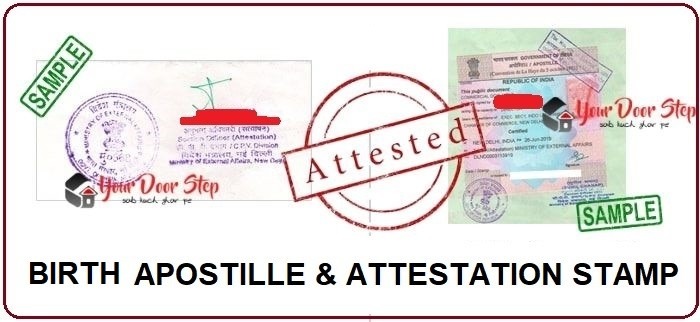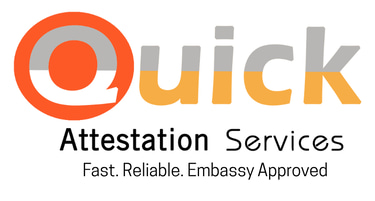A Comprehensive Guide to UAE Embassy Attestation for Birth Certificates
7/24/20255 min read


Understanding Embassy Attestation
Embassy attestation refers to the process of verifying the authenticity of documents by embassies or consulates. This procedure is essential, particularly for foreign documents intended for use in a particular country, such as the United Arab Emirates (UAE). The primary purpose of embassy attestation is to ensure that documents meet the legal standards required by the UAE authorities for various administrative and legal processes, including the use of birth certificates for residency, schooling, and other essential services.
When a document undergoes the attestation process, the embassy or consulate examines it to confirm its legitimacy. This authentication step is crucial, as it provides legal assurance that the document is genuine and has been issued by a legitimate authority in the originating country. For individuals moving to the UAE, whether for work or family reasons, having their birth certificates attested can significantly simplify the transition and integration processes. Without proper embassy attestation, foreign documents may not be accepted by UAE governmental entities, leading to potential delays or additional bureaucratic hurdles.
Moreover, the attestation process ensures that documents like birth certificates are recognized under UAE law, reinforcing their validity. This aspect is vital when dealing with matters involving legal identities, nationality applications, or any scenarios where proof of identity and lineage is required. The role of embassies in this process not only facilitates seamless document recognition but also fosters trust between nations regarding documentary integrity.
In conclusion, understanding the significance of embassy attestation for birth certificates is paramount for expatriates in the UAE. The careful inspection and validation by the relevant embassies ensure that foreign documents are legitimate, thereby safeguarding individuals' rights and expediting administrative procedures within the UAE legal framework.
The Process of Attesting a Birth Certificate
Attesting a birth certificate for use in the United Arab Emirates (UAE) involves a systematic process that ensures the document is recognized as valid by local authorities. The first step is to gather the necessary documents. Typically, you will need the original birth certificate, a copy of the parent's passport, and any marriage certificate if applicable. Depending on the issuing country, additional documents may be required. It is essential to ensure that all documents are translated into Arabic or English, as these are the official languages of the UAE.
Once you have prepared the appropriate documentation, the next step is to submit them to the relevant authorities for attestation. This usually starts with the Ministry of Foreign Affairs and International Cooperation in your home country, where they will validate the birth certificate. Following this, the documents must be sent to the UAE embassy or consulate. It is advisable to confirm any unique requirements directly with the embassy or consulate, as procedures may vary by location.
The processing time for attestation can differ based on the jurisdiction and the specific circumstances of each application. Generally, you can expect it to take anywhere from a few days to several weeks. Therefore, it is prudent to apply well in advance of when you require the attested birth certificate. Additionally, be mindful of the fees associated with the attestation process, which can vary by country and the service provider used.
To avoid unnecessary delays, double-check that all documentation is complete and accurate before submission. Any discrepancies may lead to further complications or extended processing times. By being thorough in preparation and timely in submission, you can facilitate a smoother attestation process for your birth certificate in the UAE.
Common Challenges and How to Overcome Them
The process of embassy attestation for birth certificates can often be fraught with various challenges that individuals may encounter. One of the most common issues is the submission of incomplete documentation. It is crucial to understand that each embassy has specific requirements regarding the documents needed for the attestation process. Failure to comply with these requirements can lead to delays or rejections. To mitigate this challenge, applicants should meticulously review the embassy's guidelines beforehand and ensure that all necessary documents, including translated versions if required, are complete and accurate.
Language barriers can also pose significant challenges during the attestation process, especially in a multicultural environment like the UAE. Misunderstandings arising from language differences can lead to errors in document submission or misinterpretation of the attestation requirements. To overcome this obstacle, applicants may consider enlisting the help of professional services that specialize in document processing. These professionals not only possess the expertise to navigate the nuances of language but are also well-versed in the specific requirements of various embassies, thus ensuring a smoother experience.
Adhering to the established guidelines of the embassy is of paramount importance. Each embassy may have varying processes, and failing to follow them can cause complications. It is advisable to stay informed about any updates or changes in procedures. Close communication with the embassy can help clarify doubts and provide guidance on the necessary steps to follow. For individuals who may find it challenging to understand these guidelines, consulting a professional or utilizing online platforms that provide detailed information on the attestation process can be invaluable resources.
Ultimately, recognizing these common challenges and proactively seeking solutions can significantly simplify the embassy attestation process for birth certificates. By preparing adequately and utilizing available resources, applicants can enhance their chances of a successful attestation experience.
Final Steps after Attestation
Once a birth certificate has been successfully attested by the UAE embassy, several important steps follow that ensure its effective use. First and foremost, it is essential to understand that an attested birth certificate serves multiple purposes, especially in relation to legal and bureaucratic processes. For instance, this document is critical when applying for visas, obtaining residency permits, and enrolling children in educational institutions. Each of these processes may require submission of the attested birth certificate alongside other necessary documentation.
When applying for residency in the UAE, the attested birth certificate acts as proof of the parent-child relationship and the child’s identity. It is advisable to keep several copies of the attested document. In several instances, depending on the specific requirements of different government entities, additional copies may be needed. For educational enrollment, schools often request the original attested certificate to validate the child's age and other particulars; thus, having this document readily available is beneficial.
Security of the attested document is also of utmost importance. Store the original certificate in a safe place to prevent loss or damage. It is crucial to understand that, in future scenarios, such as applying for new passports or ID cards for your child, further attestations may be required, especially if you relocate to another country or if there are changes in legal regulations. Therefore, be mindful to stay updated regarding the requirements of the UAE embassy or consulate, as laws and procedures may evolve over time.
In conclusion, following the successful attestation of a birth certificate by the UAE embassy, being prepared to effectively leverage the document for various legal purposes is essential. Keeping the document secure and being aware of future needs for further attestations will save time and ensure compliance with the administrative processes in the UAE.
